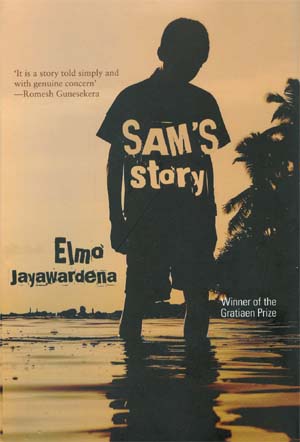Apr 14, 2025
Apr 14, 2025
 The year is 2001. And the country is Sri Lanka. Sam, a dim witted boy, ekes out an existence with his mother, brothers and sisters in a tiny village that has fallen off the map.
The year is 2001. And the country is Sri Lanka. Sam, a dim witted boy, ekes out an existence with his mother, brothers and sisters in a tiny village that has fallen off the map.
His fortunes change when he gets a job as a houseboy in Colombo. But life is not a cakewalk as ethnic violence grips Sri Lanka.
Sam is the window to the social and political landscape of Sri Lanka, ravaged by violence for 15 years, in Elmo Jayawardena's award-winning book, "Sam's Story", which has been published by Penguin Books-India this month for the Indian audience.
Elmo Jayawardena, former pilot and founder-president of AFLAC International, a humanitarian organization, has written two other award-winning books, "Kingdom of Sinhalay" and "Rainbows in Braille".
He has featured in Forbes Global for his charity work and was honored with the Everyday Hero award by the Readers' Digest in 2001.
In the novel, Sam tells us about the days in his life with humor that stems from his simplicity. He takes the reader on a journey of contemporary Sri Lanka, its urban and rural life, poverty, corruption, egg-hoppers and Christmas parties, boxing dogs, gin and tonic.
Sam, who is in love with the number "25" and "2000" - the year he became a houseboy at River House, comes across as a sad and "psychologically bruised" boy, "who is used to getting strange looks from people and questioned about mundane things", most of which he cannot remember.
The book has a slightly nostalgic feel to it and reads like a lament to the loss of lives and the bullets that have riddled the emerald isle.
Sam's friends at River House are the tall and thin Lena with her shiny brown coat and the restive Bhurus (distorted of Brutus) - two dogs.
River House, which is huge with separate rooms for reading, eating and even talking, is in sharp contrast to Sam's hovel in the village.
"Back, where I came from, in our village, most houses had one room. We did everything there, within those four walls. I mean, they were not real walls, more like half-rotten planks. But at least, there was no confusion," says Sam, pointing out the economic disparity between the rural and urban life in Sri Lanka.
The book jumps back and forth in time and place.
While it begins with Sam's snapshots of life in River House in first person, it switches back intermittently to life in his village where the boy and his two siblings - an older brother and a younger sister - watch the politics of hollow promises surrounding the Sri Lankan election and unfolding of the ensuing ethnic strife that engulfs the trio.
River House then is far away from the violence - untouched by the rough and tumble of Tamil extremism and the government backlash.
Sam's older brother joins the army because the pay is good and when "the soldiers died, they gave the money to the family". The boys in the town did not want to join the army. But those from the villages did, says Sam.
Sam's words prove prophetic. "It was the Madam, who gave me the telephone message. She said someone from the village had called and they wanted me to come home. ... But I did not feel all right. Somehow, I knew something was very very wrong at home."
The soldiers come to cremate Sam's brother Jaya. "They were his friends. The military paid for everything, including the pyre and the firewood. I guess the military men were trying to even the score. Our Jaya had paid them with his life," analyses Sam.
The book ends with the war coming to town in Colombo. A bomb goes off in the bank and Sam and his friends in the River House realize that the Madam and the Master - the owners of River House - were in the bank.
The master, whose job was to carry people around in an airplane, dies in the blast though "he had nothing to do with the war".
It marks the end of Sam's "brush with a secure life" at River House.
Tamil Tiger chief Velupillai Prabhakaran may be dead, but the book leaves readers wondering: Is the war in Sri Lanka really over?
22-Jun-2009
More by : Madhusree Chatterjee